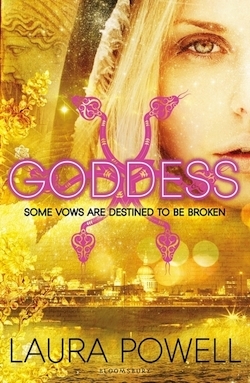 Greek mythology with a fresh twist is how I would describe Goddess by Laura Powell. Strikes, starvation, and riots: Britain is crumbling and a young soon-to-be Priestess named Aura from the Cult of Artemis is blind to it all. But everything changes when Aura meets a rebellious boy named Aiden whose radical ideas cause her to second guess everything she was born to believe in.
Greek mythology with a fresh twist is how I would describe Goddess by Laura Powell. Strikes, starvation, and riots: Britain is crumbling and a young soon-to-be Priestess named Aura from the Cult of Artemis is blind to it all. But everything changes when Aura meets a rebellious boy named Aiden whose radical ideas cause her to second guess everything she was born to believe in.
Goddess is honestly a book you should add to your summer reading list, and pronto! It's short and sweet and wonderfully original. Author Laura Powell, who also wrote Burn Mark -- a young adult novel about witch hunters and witches -- has a beautiful way of telling a story that feels completely effortless. I caught up with the amazing Laura Powell to get all the details about her lovely book.
What was the inspiration behind your book Goddess?
I love mythology of all kinds, and especially the stories of Ancient Greece, with their vindictive, quarrelsome gods. I'm also interested in prophecy and fortune-telling, and how this has influenced people and events throughout history. So I wanted to set a contemporary story -- a conspiracy thriller, really -- in an alternate Britain that still worships the Ancient Greek goddess Artemis. Artemis is the goddess of moon, hunting and chastity, and a fairly terrifying personality! My book imagines modern-day teenagers brought up as pagan priestesses, with the job of giving oracles (prophecies) to the nation.
However, it turns out that predicting the future can be a dangerous business -- especially when those prophecies expose the crimes of some very powerful people.
Tell me a bit about your background and how you became a writer.
 I grew up in Wales and had a very old-fashioned country childhood, spending most of the time with my nose in a book. I went to an all-girls' boarding school from the age of 11, which I absolutely hated. Then I read Classics at Bristol and Oxford, and worked for five years in children's publishing in London before leaving to concentrate on my own books. (I also have a part-time job at a ballet company, where I spend my time surrounded by beautiful people in leotards and quite a lot of sequins...)
I grew up in Wales and had a very old-fashioned country childhood, spending most of the time with my nose in a book. I went to an all-girls' boarding school from the age of 11, which I absolutely hated. Then I read Classics at Bristol and Oxford, and worked for five years in children's publishing in London before leaving to concentrate on my own books. (I also have a part-time job at a ballet company, where I spend my time surrounded by beautiful people in leotards and quite a lot of sequins...)
Writing began as a way of earning an extra income to support my publishing career, but then I realized I was actually better at writing my own books than editing other people's. I haven't looked back since!
One of things I loved about your book is the modern setting mixed with Greek mythology. What made you decide to mix the two?
I discovered the little-known legend that Britain was actually founded by an exiled prince of Troy called Brutus. You can see the altar stone he was supposed to have put up to the Goddess Artemis behind a grille in an ordinary London street. Legend has it that as long as "Brutus's Stone" is safe, the city is too.
So in the alternate world of Goddess, twenty-first century Britons still believe King Brutus was our founding father and they still follow his religion. There have been decades of unemployment, strikes, riots and corrupt governments, and people feel the Cult of Artemis is the only authority they can trust. But is Artemis -- a famously cruel and vengeful goddess -- really somebody who deserves worship?
This question is encapsulated in the struggles of a young priestess, Aura. She longs to lead a normal life in the modern world. However, the goddess has other plans for her...
Another thing I liked about the book was Aura and her character transformation. What went into the development of her character?
Aura was left as a baby on the steps of the Temple of Artemis. The temple, and the cult, is the only home she's ever known and as a result she's led a very sheltered life. They may live in the lap of luxury, but girls in the Cult of Artemis aren't allowed to watch TV or use the Internet, and even reading newspapers is censored. And boys are definitely not allowed.
As a result, Aura starts off very naïve. When she first meets Aiden, the rebellious son of a wealthy patron of the cult, she's appalled by his blasphemy. She also knows that getting too close to him could be fatal for them both, since the goddess has all sorts of nasty punishments for priestesses who break their vows. So it was interesting to explore that kind of tension -- teenage hormones v. religious beliefs.
Aura goes from mousy priestess to rebel leader when she starts giving prophecies that make her the figurehead of a pro-democracy revolutionary movement. It's not an easy transition. Most of the people in the book are out to manipulate or exploit her in some way (even the good guys) and so the story is really about Aura finding her own voice and identity. She's not "kick-ass" in the traditional sense of beating up baddies, but she has to find new sources of strength and cunning all the same.
What is next for you in terms of writing? Can we expect any new projects from you soon?
My next book -- which I'm still writing, eek -- will be called The Crossing. I'm going back to the Welsh legends of my childhood, and writing a fantasy adventure based on the characters of the Mabinogian; a medieval collection of folktales. The story centers on the Welsh otherworld of Annwn, which is a place full of magical dangers and temptations...
If you had to describe Goddess in one word, what would it be?
SINISTER
(mwah ha ha ha!)